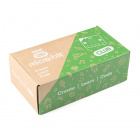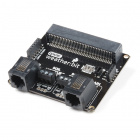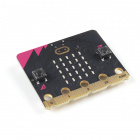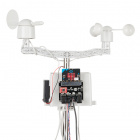SparkFun gator:environment Hookup Guide
Contributors:
santaimpersonator,  Englandsaurus
Englandsaurus
Resources and Going Further
For more product information, check out the resources below:
- Schematic (PDF)
- Eagle Files (ZIP)
- BME280 Datasheet (PDF)
- CCS811 Datasheet (PDF)
- CCS811 Design Guide (PDF)
- CCS811 Factsheet (PDF)
- gator:environment PXT Package
- GitHub Product Repo
- micro:bit Landing Page
- SFE Product Showcase
Interested in the micro:bit? Check out some of these other micro:bit products:
Need some inspiration for your next project? Check out some of these other micro:bit product tutorials:
micro:bit Educator Lab Pack Experiment Guide
A quickstart guide for the micro:bit educator lab pack.
micro:climate Kit Experiment Guide
A weather station kit that is built on top of the inexpensive, easy-to-use micro:bit and Microsoft MakeCode.
micro:bot Kit Experiment Guide
Get started with the moto:bit, a carrier board for the micro:bit that allows you to control motors, and create your own robot using this experiment guide for the micro:bot kit.
micro:bit Breakout Board Hookup Guide
How to get started with the micro:bit breakout board.
For more information on the CCS811 or BME280, check out the resources below:
SparkFun BME280 Breakout Hookup Guide
A guide for connecting the BME280 sensor to a microcontroller, and for using the SparkFun Arduino library.
micro:climate Kit Experiment Guide
A weather station kit that is built on top of the inexpensive, easy-to-use micro:bit and Microsoft MakeCode.
CCS811 Air Quality Breakout Hookup Guide
This tutorial shows you how to get data from a CCS811 breakout board with the I2C interface.
CCS811/BME280 (Qwiic) Environmental Combo Breakout Hookup Guide
Sense various environmental conditions such as temperature, humidity, barometric pressure, eCO2 and tVOCs with the CCS811 and BME280 combo breakout board.



